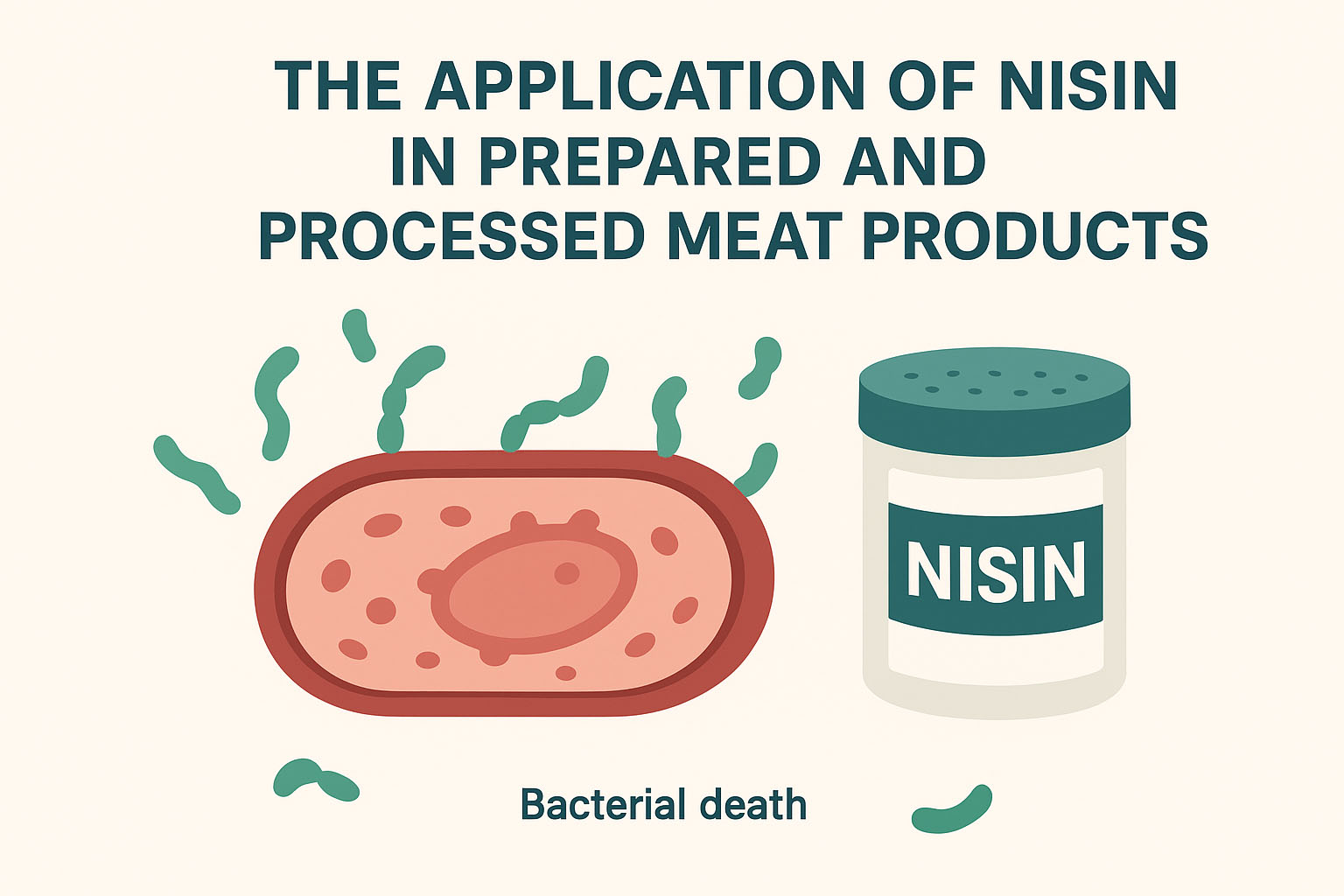Introduction: The Challenge of Preserving Prepared Meat Products
Prepared and processed meat products—such as sausages, ham, deli meats, and ready-to-eat meals—are highly susceptible to **microbial spoilage** and **pathogenic contamination**. Because of their high protein and moisture content, these foods provide an ideal environment for bacteria to thrive.
Traditionally, synthetic preservatives like nitrites or benzoates have been used to ensure safety and prolong shelf life. However, growing consumer demand for natural, clean-label solutions has led to the rise of Nisin, a natural antimicrobial peptide, as a safe and effective alternative.
What is Nisin?
Nisin is a natural antimicrobial peptide produced by Lactococcus lactis during fermentation. It belongs to a group of bacteriocins—proteins with antimicrobial properties—that target and destroy specific bacteria.
Approved by regulatory agencies such as the FDA, EFSA, and WHO, Nisin has been used safely in food systems worldwide for decades. It’s heat-stable, non-toxic, and biodegradable, making it ideal for preserving meat products without altering taste or texture.
How Nisin Works in Meat Products?
Nisin’s antimicrobial mechanism is both simple and powerful:
1. Targets Gram-positive bacteria such as Listeria monocytogenes, Clostridium botulinum, and Staphylococcus aureus.
2. Disrupts bacterial cell membranes by binding to lipid II, a molecule essential for cell wall synthesis.
3. Causes cell leakage and death, effectively preventing bacterial growth.
This mechanism makes Nisin especially valuable for ready-to-eat and cooked meat products, which are prone to spoilage during storage and distribution.
Benefits of Using Nisin in Prepared Meat Products
1. Natural Food Preservation
Nisin provides an effective natural alternative to synthetic preservatives. It meets the increasing consumer demand for clean-label, minimally processed foods while maintaining product safety.
2. Extends Shelf Life
By inhibiting spoilage bacteria and pathogens, Nisin significantly extends the shelf life of meat products—often by several days or weeks—without compromising sensory qualities such as flavor, texture, or color.
3. Enhances Food Safety
Nisin helps control foodborne pathogens such as Listeria monocytogenes and Clostridium botulinum, both of which are major concerns in meat processing. This ensures the microbiological safety of ready-to-eat and cooked meats.
4. Maintains Product Quality
Nisin preserves the natural freshness, color, and juiciness of meat products. It prevents microbial degradation that causes unpleasant odors, slime formation, and discoloration.
5. Synergistic Effects with Other Natural Ingredients
When combined with other natural preservatives like **ε-Polylysine** or **organic acids**, Nisin shows **synergistic antimicrobial effects**, allowing manufacturers to use lower doses while achieving stronger protection.
Applications of Nisin in the Meat Industry
|
Product Type
|
Microbial Targets
|
Effect of Nisin
|
|
Cooked & Ready-to-Eat Meat
|
Listeria monocytogenes
|
Prevents contamination during packaging and storage
|
|
Sausages & Hot Dog
|
Clostridium botulinum
|
Inhibits spore-forming bacteria
|
|
Cured Meats
|
Staphylococcus aureus
|
Reduces spoilage and maintains product colo
|
|
Chilled and Vacuum-Packed Meats
|
Lactic acid bacteria
|
Extends shelf life and freshnes
|
|
Fermented Meat Products
|
Unwanted bacteria
|
Improves fermentation control and product stability
|
Regulatory Approval and Safety
Nisin is recognized as Generally Recognized as Safe (GRAS) by the U.S. FDA*, and approved for use in the European Union (E234). It’s also widely accepted in Asia, including Japan and China, for use in meat, dairy, and beverage applications.
Its biodegradability and non-toxic nature make it one of the safest biopreservatives in the food industry.
Sustainability and Clean-Label Benefits
Nisin contributes to sustainable food processing by reducing food waste and energy consumption associated with refrigeration and reprocessing. Its natural origin aligns perfectly with global efforts to minimize chemical preservatives and promote eco-friendly production.
By enabling longer shelf life and fewer rejections due to spoilage, Nisin helps manufacturers reduce carbon footprint while satisfying modern consumers’ expectations for natural and sustainable products.
Conclusion: Nisin—A Natural Solution for the Future of Meat Preservation
In today’s food industry, Nisin stands out as a natural, safe, and effective solution for preserving prepared and processed meats. It provides powerful protection against harmful bacteria, extends shelf life, and helps producers meet clean-label and sustainability goals.
As consumer preferences continue to shift toward natural and minimally processed foods, Nisin will play an increasingly vital role in ensuring the safety and quality of modern meat products.
